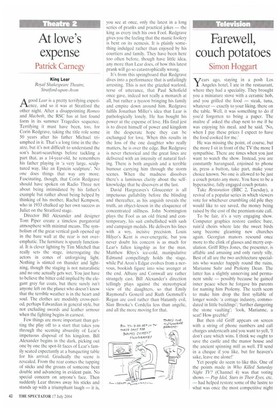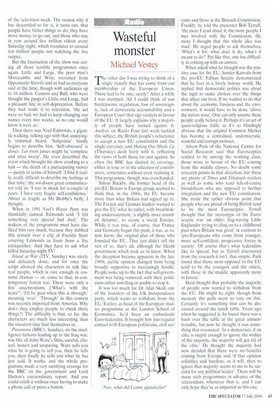Farewell, couch potatoes
Simon Hoggart
N7ears ago, staying in a posh Los 1 Angeles hotel, I ate in the restaurant, where they had a speciality. They brought you a miniature stove with a ceramic hob, and you grilled the food — steak, tuna, whatever — exactly to your liking, there on the table. Well, it was something to do if you'd forgotten to bring a paper. The maitre d' asked the chap next to me if he was enjoying his meal, and he said, 'No, when I pay these prices I expect to have the food cooked for me.'
He was missing the point, of course, but the more I sit in front of the TV the more I sympathise. There are times when you just want to watch the show. Instead, you are constantly harangued, enjoined to phone in, press a button, take part, make your choice known. No one is allowed to be just a couch potato any more. You have to be a hyperactive, fully engaged couch potato.
Take Restoration (BBC 2, Tuesday), a revival of a popular series in which viewers vote for whichever crumbling old pile they would like to see saved, the money being raised by the cost of the premium-rate call.
To be fair, it's a very engaging show. Computer graphics restore castles: bare, ruin'd choirs where late the sweet birds sang become gleaming new churches again. Georgian manors resound once more to the clink of glasses and merry copulation. Griff Rhys Jones, the presenter, is affable and amusing and only rarely silly. Best of all are the two architecture specialists who wander happily round the ruins, Marianne Suhr and Ptolemy Dean. The latter has a slightly unnerving and permanent smile — possibly because he gained inner peace when he forgave his parents for naming him Ptolemy. The teeth seem to make him drop the first syllable of longer words: 'a cottage industry, commodated in little buildings': 'further dangering the stone vaulting': 'look, Marianne, a seat! How greeble!'
But then old Griff appears on screen with a string of phone numbers and call charges underneath and you want to yell, 'I don't care which wins. I think we ought to save the castle and the manor house and the ancient spinning mill as well. I'll send in a cheque if you like, but for heaven's sake, leave me alone!'
Yet people do seem to like this. One of the points made in Who Killed Saturday Night TV? (Channel 4) was that voting shows — Pop Idol, Stars in Their Eyes, etc. — had helped restore some of the lustre to what was once the most competitive night of the television week. The reason why it has descended so far is, it turns out, that people have better things to do; they have more money to go out, and those who stay in rent around five million videos every Saturday night, which translates to around ten million people not watching the live output.
But the fascination of the show was seeing all those terrible programmes once again. Little and Large, the poor man's Morecambe and Wise, recruited from Opportunity Knocks and as bad as everyone said at the time, though with audiences up to 16 million. Cannon and Ball, who were thought the pauper's Little and Large, had a pleasant line in self-deprecation. Before they had made it to television, 'the act were so bad, we had to keep changing our names every two weeks, so no one would know it were us'.
Then there was Noel Edmonds, a gigantic walking, talking ego with that annoyingly trimmed beard, 'Solipsistic' hardly begins to describe him. 'Self-obsessed' is closer. Les mots justes might be 'complete and utter twerp'. He even described the event which brought his show crashing to a halt — the death of a participating viewer — purely in terms of himself. 'I find it really, really difficult to describe my feelings at that time,' the soi-disant great communicator told us. 'I was in shock for a couple of years. I have very fragile self-confidence.' About as fragile as Mr Blobby's belly, I thought.
When in 1991 Noel's House Party was thankfully canned, Edmonds said, felt something very special had died.' The makers of the programme must have disliked him very much, because they dubbed this remark over a clip of Freddie Starr covering Edmonds in foam from a fire extinguisher. And they have to ask what killed Saturday night TV!
Island at War (ITV, Sunday) was nicely and delicately done, and for once the script allowed the characters to talk like real people, which is rare enough in costume dramas — or, come to that, in contemporary fiction too. There were only a few anachronisms ('What's with the tears?'; 'I'll be glad when this is through,' meaning 'over'. 'Through' in this context was recently imported from America. Why don't they employ people to check these things?) The difficulty is that, so far, the characters are much less interesting than the situation they find themselves in.
Panorama (BBCI, Sunday), on the intelligence failures leading up to the Iraq war, was like all John Ware's films, careful, clinical, honest and unsparing. Ware tells you what he is going to tell you, then he tells you, then finally he tells you what he has just said. It works, and the whole programme made a very satisfying revenge for the BBC on the government and Lord Hutton's extraordinary report. And you could relish it without once having to make a phone call or press a button.



























































 Previous page
Previous page